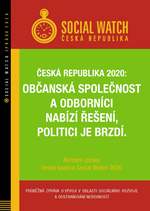Social Watch Czech Republic releases an annual report evaluating the progress of the Czech Republic towards reaching the UN Sustainable Development Goals. The report is divided into five sections: people, planet, prosperity, peace, and partnership.
The Czech Republic is failing to meet many of the UN sustainable development targets, with progress only visible in certain areas, according to a report last week from Social Watch CZ, a non-governmental organization that monitors compliance with the goals.
The report is divided into five sections: people, planet, prosperity, peace, and partnership, with each section assessing the country’s progress in meeting the goals agreed by UN member states in 1995. It also contains shorter contributions from specific authors on issues of particular concern. Part of a network operating in 96 different countries, Social Watch has nine member organizations in the Czech Republic.
Among the report’s findings:
- Former Ombudswoman Anna Šabatová, now running for the Senate with the support of the Green Party, authors a section on human rights, drawing attention to the insufficient laws against the corporal punishment of children, and calling for the establishment of a special children’s ombudsman. She criticises the Czech Republic for not ratifying the Istanbul Convention on violence against women, even though 80% of the population think more steps should be taken to prevent gender violence. She also highlights the counter-productive charge of CZK 10,000 for whistleblowers reporting irregularities in the award of a public tender, and the overcrowding in Czech prisons.
- Šárka Homfray writes about the so-called “grey economy”, and how it is thriving in the Czech Republic; inspections of businesses in the informal economy in 2018 and 2019 found people illegally employed in more than half of cases. Problematic areas include employees working on a trade license in roles more suited to hourly wages, and staff from abroad employed through employment agencies. During the COVID-19 pandemic, the state introduced special measures such as nursing care for the self-employed, which Homfray argues should be continued after the end of the pandemic.
- Zbyněk Němec monitors the progress of children from socially disadvantaged families in the education system, and draws attention in particular to the segregation of Roma children, which creates Roma-only classes. Social disadvantages for children and young people often leads to a significant reduction in their educational prospects, and thus in their freedom to choose a future profession.
- Macroeconomist Jiří Šteg writes that, compared to the rest of the European Union, the Czech Republic lags behind in terms of wages and quality of life. In recent years, the country has not seen any new incentives to support small and medium-sized businesses or cooperatives. He argues that the local economy is dependent on the global economy, and the economic downturn associated with the COVID-19 pandemic will be very severe. Šteg recommends investing in innovative and progressive technology instead of classic production methods, and preventing further foreclosures.
- Michaela Pixová from the Climate Coalition covers sustainable cities, highlighting the serious problem of overpriced rental housing. She argues that the Ministry of Environment’s subsidy programs for the replacement of non-ecological boilers and the retention of rainwater are small measures, rather than a systemic solution. This follows a trend of government actions that fail to address the most pressing problems in a substantial way, such as the construction of a water canal or a new nuclear reactor, which underestimate the potential of renewable resources.
- Daniel Vondrouš, director of the Association of Environmental NGOs, evaluates the performance of politicians in the field of climate, commenting that the land is drying up due to poor agricultural and forest management, as well as climate change, and that despite sufficient levels of rainfall in recent months, the soil cannot retain water. He says the approach of Czech politicians is lazy and proposed solutions are insufficient, as the planned dams will not hold enough water in the landscape, nor is the construction of additional nuclear reactors a sustainable solution. He concludes that “the lack of perspective of our politicians and officials must be replaced by improvisation from citizens: we plant trees, collect water, sew facemasks, and sort our trash. Of course, this won’t be possible without the involvement of the people. But for real change, we need those who we pay to do their job better.”
You can read the full report here (.pdf, in Czech).
By Jack Stepens.
Source: BRNO Daily.



